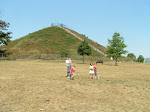Monday, October 1, 2007
A wonderful site for Christian women
http://www.aboverubies.org/ - This site is a great place to rejuvinate yourself. If you just need a little or even a big pick me up. Take a visit.
Does a Wise Woman Build Her House or Divide It?
An Old Testament Parable
Wisdom And The Foolish Woman
Wisdom And The Foolish Woman
"For wisdom is better than rubies; and all the things that may be desired are not to be compared to it."—Proverbs 8:11
A verse by verse study in Proverbs 9.
The book of Proverbs can be divided into three sections. The first six chapters are introductory and stress the necessity of gaining true wisdom. Chapter ten begins with the words "The proverbs of Solomon" and contains a lengthy list of wise adages, closing with two chapters which are either copies from other writers or are by Solomon, but written under pseudonyms, or pen names, as the Jewish authorities argue. These apparently are not arranged in a random order, but specifically placed. This is suggested in Solomon’s autobiographical book, Ecclesiastes: "And moreover, because the preacher was wise, he still taught the people knowledge; yea, he gave good heed, and sought out, and set in order many proverbs" (12:9).
The intervening section of Proverbs is in the form of a parable or allegory in which the characteristics of wisdom and foolishness are contrasted. In chapter seven we have a complete description of foolishness portrayed as a seductive prostitute, her seductive tactics likened unto the temptation of the great adversary of all mankind, the Devil. In chapter eight we find a poetic description of wisdom and its origins which many expositors interpret as a personification of Jesus. Then in chapter nine, the chapter we will here investigate, we find both brought into play in marked contrast to each other.
The Messenger—Verses 1 to 3
"Wisdom hath builded her house, she hath hewn out her seven pillars: She hath killed her beasts; she hath mingled her wine; she hath also furnished her table. She hath sent forth her maidens: she crieth upon the highest places of the city.".
The house of wisdom is contrasted with the house of the foolish woman (v. 14). The action of the chapter is the contrasting invitation by both wisdom and the foolish woman to entice the wayfarer therein. Wisdom’s house is said to be of seven pillars. Whether the number seven is to be taken in anything more than a symbolic sense of completeness is unclear. It is worthy of note, however, that James, in describing wisdom, mentions seven specific attributes in connection therewith.
If, on the other hand, wisdom be taken here as it is in chapter eight, as a personification of Jesus, we note that his house, the church, is also associated with the number seven—seven stages, the "seven churches" of Revelation 2 and 3.
The festive table laden with slain beasts and mingled wine is another figure suggestive of Jesus. Of all Biblical meals one has more attention than the last supper of Jesus’ life where he replaced the symbols of the old Aaronic priesthood, lamb and bitter herbs, with those of the incoming Melchizedek priesthood, bread and wine. The Passover gives way to the commemoration of its antitype, the death of Jesus. Here, in Proverbs 9, we find the combining of these two symbols—the slain beasts of the Law dispensation and the mingled wine of the Gospel age.
The obvious connections between the maidens who proclaim the message of wisdom with the parable in which likens his church to a group of "ten virgins" seems to be more than coincidence. After his death on Calvary’s cross, the church becomes his spokesmen, spreading the gospel message throughout the world (Matt. 28:19, 20).
The "highest places of the city" also finds its counterpart in the location of the harlot’s house in verse 14, "on a seat in the high places of the city." Both invitations—that of the Lord, or wisdom, and that of the adversary, pictured by the "foolish woman"—go forth from the same locale. In ancient cities, even as often today, the higher elevations of the towns usually appealed to the more noble classes. Certainly the gospel message, as well as Satan’s attempt to divert people from it, has concentrated its efforts on the more civilized portions of the globe, "the higher places" of the global city of mankind.
Wisdom’s Message—Verses 4 to 6
"Whoso is simple, let him turn in hither: as for him that wanteth understanding, she saith to him, Come, eat of my bread, and drink of the wine which I have mingled. Forsake the foolish, and live; and go in the way of understanding."
The gospel message is for the simple. The starting point of Jesus’ beatitudes in the Sermon on the Mount so begins: "Blessed are the poor in spirit: for theirs is the kingdom of heaven" (Matt. 5:3). The enticements of the Lord are graphically and romantically portrayed in an excerpt from the Song of Solomon, chapter eight, verses one and two: "O that thou wert as my brother, that sucked the breasts of my mother! when I should find thee without, I would kiss thee; yea, I should not be despised. I would lead thee, and bring thee into my mother’s house, who would instruct me: I would cause thee to drink of spiced wine of the juice of my pomegranate."
It is not to her bed, as the harlot desires, but to her table that the Lord invites. Partake with him of those Memorial emblems, the bread and the wine, his flesh and his blood. The "mingling" of the blood can suggest either the transfer of his spiritual life to assume human form for the purpose of suffering death for every man, or the continuing offer to his followers to become co-participants in the "wine" of his sufferings, to drink of the cup of which he drank (Matt. 20:22, 23).
For them the invitation is a new life style. "Forsake the foolish," "repent and be converted," "be transformed by a renewing of your mind" (Acts 3:19; Rom. 12:2). Because this new way involves a "renewing of the mind" in entails new thought patterns and new sets of values, therefore it is called in our parable "the way of understanding."
The Audience—Verses 7 to 12
"He that reproveth a scorner getteth to himself shame: and he that rebuketh a wicked man getteth himself a blot. Reprove not a scorner, lest he hate thee: rebuke a wise man, and he will love thee. Give instruction to a wise man, and he will be yet wiser: teach a just man, and he will increase in learning. The fear of the LORD is the beginning of wisdom: and the knowledge of the holy is understanding. For by me thy days shall be multiplied, and the years of thy life shall be increased. If thou be wise, thou shalt be wise for thyself: but if thou comest, thou alone shalt bear it."
In any audience there are two kinds of hearers—those who believe the message and those who do not. In this section in our text we meet these two classes as the "scorner" and the "wise man." Not only does the reproof of the gospel to the scorner bring unawareness, but it also incurs his anger against the reprover. The wise man, in contrast, will appreciate and love the one who gives him correction, realizing that such correction is for his own profit. The just man who increases his learning is reminiscent of the adage, "When you talk you repeat what you already know, when you listed you might learn something."
The modern philosophy of existentialism holds that all truth is relative and that there is no such thing as "absolute truth." The principle of wisdom given in verse ten is a direct rebuttal of such existential arguments: "The fear of the LORD is the beginning of wisdom." Recognizing Jehovah as the great "first cause" and the creator of man as well as his universe, it also recognizes that the creator has the right to dictate the rules to the created. His laws are absolute.
Building upon this he adds, "and the knowledge of the holy is understanding." Too frequently secular science stands in its own right. Great theoretical hypotheses are drawn from demonstrable evidence and proclaimed as fact. When Holy Writ comes in conflict with such "science" the Bible is deemed dated and unreliable. The author of Proverbs here argues to the contrary. His position is that "holy" or religious knowledge is based on the inspired writings of an unchangeable God, and therefore superior to the deductions of scientists, which often change with new evidence and the theories of later scholars.
In verse eleven we find out why the religious knowledge is rated first. It alone can multiply days. While medical research may lengthen life expectancy it does so primarily by curing the mortality rate of infants and children, rather than actually lengthening life. Man still begins to rapidly deteriorate at the Biblical limits of "three score and ten" or "four score" (Psa. 90:10). God’s Word alone holds out the formula for everlasting life through the sacrifice of his Son, Jesus Christ.
The Foolish Woman —Verses 13 to 15
"A foolish woman is clamorous: she is simple, and knoweth nothing. For she sitteth at the door of her house, on a seat in the high places of the city, To call passengers who go right on their ways."
Our attention is now called to the contrasting invitation. She is the same foolish woman described as a harlot or prostitute in chapter seven. The Hebrew word translated "simple" has, according to Strong’s Concordance, the implication of seduction. The word translated "clamorous" includes not only the stridency of her voice, but the spectacle of her appearance, as that of a harlot’s apparel. The "high places of the city." while including the residency of the more affluent, were also the location of the pagan temples (see 1 Kings 11:7; 2 Kings 23:15 for examples). Cult prostitution was often a part of these worship services and therefore a natural gathering ground for women of this profession. Her audience is the heedless, the passers-by who "go right on their ways," unmindful of anything beyond temporary gratification.
Her Message—Verses 16 to 18
"Whoso is simple, let him turn in hither: and as for him that wanteth understanding, she saith to him, Stolen waters are sweet, and bread eaten in secret is pleasant. But he knoweth not that the dead are there; and that her guests are in the depths of hell [sheol]."
The audience attracted by the foolish woman is further described as "simple," or, as the New American Standard phrases it, "naive." Their naivete is based on their lack of understanding, which is in turn based upon their rejection of the "knowledge of the holy" (v. 10). What they lack is a moral or ethical base, therefore their consciences permit what God does not allow. The perversity of fallen human nature is outlined only too well in the phrase: "Stolen waters are sweet, and bread eaten in secret is pleasant." Fallen tendencies take delight in the thought of "getting away with something." How often have we noted the strength of temptation lying in the thought that we will not be discovered in our transgressions. Sin becomes almost a game, with the object to preserve an outward purity while giving vent to human passions within.
The conclusion of the parable emphasizes the naivete and is similar to another proverb of Solomon: "There is a way which seemeth right unto a man, but the end thereof are the ways of death" (Prov. 14:12).
Once man tries to ignore the teachings of true wisdom, the wisdom of Christ, he is left to his own devices. These usually prove disastrous. A case in point is the history of Israel during the period of Judges when, after repetitive deliverance from their enemies, Israel kept reverting to the pagan idolatry of their neighbors. In summing up that historical era, the last verse of the book of Judges reads: "In those days there was no king in Israel: every man did that which was right in his own eyes" (Judg. 21:25).
How glad we are that the "hell" to which those who accept the invitation of the foolish woman end up is not the traditional fiery "hell" of Christendom, or even the "gehenna hell" of the New Testament from which there is no return, but the "death and hell" of Revelation 20:13 which eventually shall deliver "up the dead which are in them" for the future judgment of God’s kingdom when he shall "judge every many by that man whom he has ordained", Jesus Christ the righteous (Acts 17:31).
Solomon himself saw the twin invitations of wisdom and foolishness, following first the latter before going back and taking the other path, "the road less taken." He sums up the struggle between the two and his final conclusion in the closing words of Ecclesiastes, "Let us hear the conclusion of the whole matter: Fear God, and keep his commandments: for this is the whole duty of man. For God shall bring every work into judgment, with every secret thing, whether it be good, or whether it be evil" (Eccl. 12:13, 14).
Classic Adventures: School Days
Classic Adventures: School Days - The post at this link really sums up a lot about the unique possibilities that homeschooling has to offer.
Crazy Busy Schedules
This weekend my husband drove home Friday night, my daughter had a soccer game, my son had a birthday party, we are gathering paperwork for a refinance and did I mention that we homeschool?
This is definately a full schedule. Although our Loan Officer has been awesome!!! Her name is Lorna Jones. If you ever need help with a mortgage, she's the lady you'll wanna call. She doesn't make promises she can't keep.
Thank God it's Monday????? That sounds strange doesn't it?
Technorati Profile
This is definately a full schedule. Although our Loan Officer has been awesome!!! Her name is Lorna Jones. If you ever need help with a mortgage, she's the lady you'll wanna call. She doesn't make promises she can't keep.
Thank God it's Monday????? That sounds strange doesn't it?
Technorati Profile
Subscribe to:
Comments (Atom)




